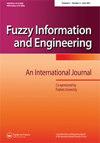Extension of Duality Results and a Dual Simplex Method for Linear Programming Problems With Intuitionistic Fuzzy Variables
IF 1.3
Q2 MATHEMATICS, APPLIED
引用次数: 1
Abstract
The aim of this paper is to introduce a formulation of linear programming problems involving intuitionistic fuzzy variables. Here, we will focus on duality and a simplex-based algorithm for these problems. We classify these problems into two main different categories: linear programming with intuitionistic fuzzy numbers problems and linear programming with intuitionistic fuzzy variables problems. The linear programming with intuitionistic fuzzy numbers problem had been solved in the previous literature, based on this fact we offer a procedure for solving the linear programming with intuitionistic fuzzy variables problems. In methods based on the simplex algorithm, it is not easy to obtain a primal basic feasible solution to the minimization linear programming with intuitionistic fuzzy variables problem with equality constraints and nonnegative variables. Therefore, we propose a dual simplex algorithm to solve these problems. Some fundamental concepts and theoretical results such as basic solution, optimality condition and etc., for linear programming with intuitionistic fuzzy variables problems, are established so far. Moreover, the weak and strong duality theorems for linear programming with intuitionistic fuzzy variables problems are proved. In the end, the computational procedure of the suggested approach is shown by numerical examples.具有直观模糊变量的线性规划问题对偶结果的推广及对偶单纯形方法
本文的目的是引入一个包含直觉模糊变量的线性规划问题的公式。在这里,我们将专注于对偶性和基于simplex的算法来解决这些问题。我们将这些问题分为两大类:直觉模糊数线性规划问题和直觉模糊变量线性规划问题。以往的文献已经解决了带有直觉模糊数的线性规划问题,在此基础上给出了求解带有直觉模糊变量的线性规划问题的一种方法。在基于单纯形算法的方法中,对于具有等式约束和非负变量的直觉模糊变量最小化线性规划问题,不容易得到一个原始的基本可行解。因此,我们提出一种对偶单纯形算法来解决这些问题。本文建立了直觉模糊变量线性规划问题的基本解、最优性条件等基本概念和理论结果。此外,还证明了具有直觉模糊变量的线性规划问题的弱对偶定理和强对偶定理。最后,通过数值算例说明了该方法的计算过程。
本文章由计算机程序翻译,如有差异,请以英文原文为准。
求助全文
约1分钟内获得全文
求助全文
来源期刊

Fuzzy Information and Engineering
Mathematics-Logic
CiteScore
2.30
自引率
0.00%
发文量
13
审稿时长
40 weeks
期刊介绍:
Fuzzy Information and Engineering—An International Journal wants to provide a unified communication platform for researchers in a wide area of topics from pure and applied mathematics, computer science, engineering, and other related fields. While also accepting fundamental work, the journal focuses on applications. Research papers, short communications, and reviews are welcome. Technical topics within the scope include: (1) Fuzzy Information a. Fuzzy information theory and information systems b. Fuzzy clustering and classification c. Fuzzy information processing d. Hardware and software co-design e. Fuzzy computer f. Fuzzy database and data mining g. Fuzzy image processing and pattern recognition h. Fuzzy information granulation i. Knowledge acquisition and representation in fuzzy information (2) Fuzzy Sets and Systems a. Fuzzy sets b. Fuzzy analysis c. Fuzzy topology and fuzzy mapping d. Fuzzy equation e. Fuzzy programming and optimal f. Fuzzy probability and statistic g. Fuzzy logic and algebra h. General systems i. Fuzzy socioeconomic system j. Fuzzy decision support system k. Fuzzy expert system (3) Soft Computing a. Soft computing theory and foundation b. Nerve cell algorithms c. Genetic algorithms d. Fuzzy approximation algorithms e. Computing with words and Quantum computation (4) Fuzzy Engineering a. Fuzzy control b. Fuzzy system engineering c. Fuzzy knowledge engineering d. Fuzzy management engineering e. Fuzzy design f. Fuzzy industrial engineering g. Fuzzy system modeling (5) Fuzzy Operations Research [...] (6) Artificial Intelligence [...] (7) Others [...]
 求助内容:
求助内容: 应助结果提醒方式:
应助结果提醒方式:


